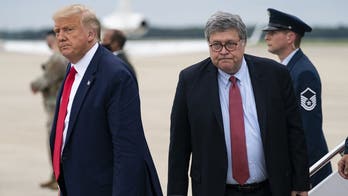Barely two months into his presidency, Ronald Reagan was followed by a lone gunman to the Washington Hilton. There, the president and an entourage of advisers and security officials were shot up by a crazed John Hinckley.
It was a dark day for the nation -- and it was all captured on film.
"When Lincoln was shot, it took seven days for word to reach London. When Reagan was shot it took less than seven minutes," said David Gergen, a Reagan adviser.
Images of the assassination attempt were beamed around the world in an instant -- and some people knew what had happened almost as quickly as the president himself.
"I didn't know I was shot. In fact I was still asking, 'What was that noise?' I thought it was firecrackers," Reagan said.
Click here to see a clip from Television and the Presidency.
As Secretary of State Alexander Haig held a press conference on the attack, one single statement -- "I'm in charge here" -- did him in, even as he attempted to reassure the nation of the stability in the White House.
"I think it was one of those things that cost him his job as secretary of state," said Gergen. "It cost him his chance to run for president."
Reagan, back in the driver's seat, was much more handy with the medium, using TV to push his agenda and his message.
"Ronald Reagan's ability to stage pictures, to stage scenes, did affect the news coverage. The print media thought it was dishonest, it was underhanded and manipulative," said Mort Kondracke, executive editor of Roll Call. "On the other hand, television networks needed it because it was so beautiful."
Politicians lived and died by the tube, as a harsh approach to political scandal pushed television coverage and condemned some presidential candidates to the dust bin of history.
"Television and the Presidency," hosted by Chris Wallace, airs Saturday at 9 p.m. EST.




